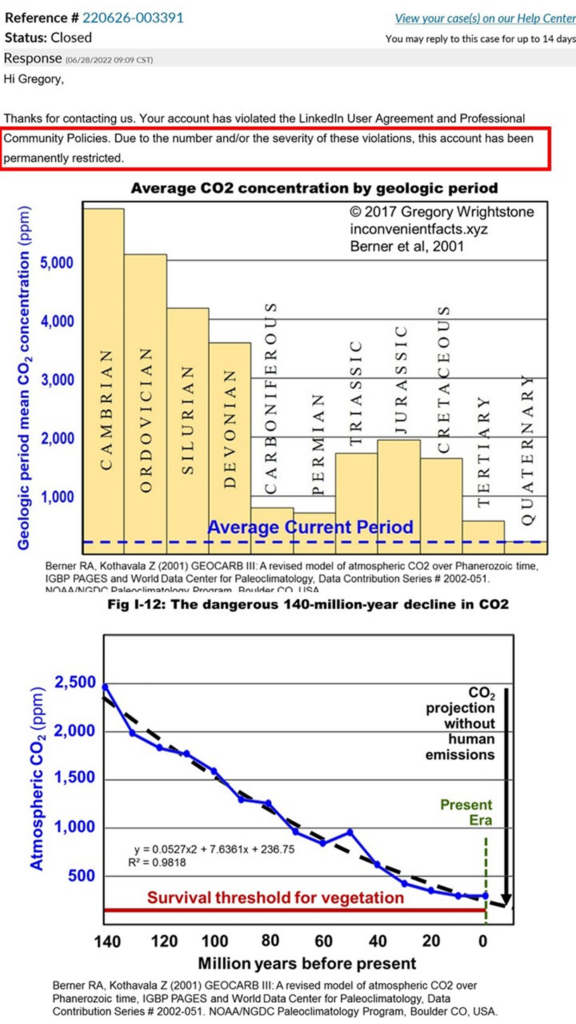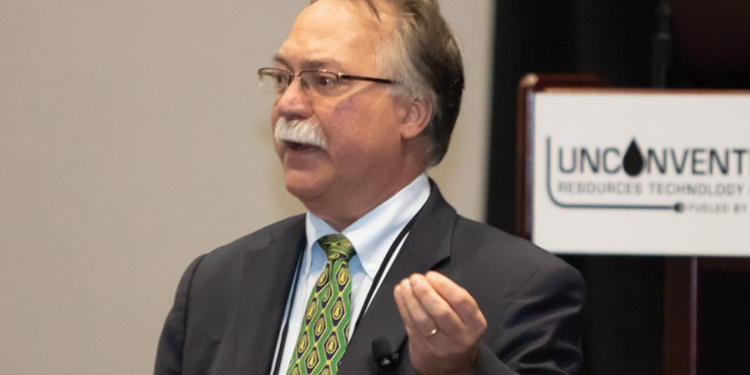Big Tech’s crackdown on sceptical climate science continues with the recent news that Gregory Wrightstone, a geologist and the Executive Director of the CO2 Coalition, has been permanently excluded from LinkedIn, a social media platform owned by Microsoft. Wrightstone has had problems with the LinkedIn censors for some time, but he noted that his final demise occurred when he posted two charts used by the IPCC. The charts show the level of carbon dioxide in the atmosphere according to the paleoclimatic record. The data come from the U.S. National Oceanic and Atmospheric Administration (NOAA) and are widely considered the best available science.

Of course the graphs above need careful handling in the politicised world of ‘settled’ climate science. They show that current amounts of CO2 in the atmosphere are at their lowest levels in Earth’s history. The level has been falling steadily for over 140 million years. And of course they fail to show a link with temperature, which has risen and fallen throughout the period without any obvious connection. Alternative explanations, some more plausible than others, suggest different forms of plants and life evolved to cope with higher CO2 levels, the sun was cooler in the past, and recent increases in the gas are unprecedented.
Commenting on his ban, Wrightstone noted that he was quickly growing a large following by showcasing the many benefits for ecosystems and humanity of modest warming and increasing CO2 levels. “I was opening eyes,” he continued, and “for that reason I needed to be silenced”.
Noting the ban, the Climate Realism newsletter reported that LinkedIn’s reason for it was that Wrightstone’s information was “false and misleading” and that “this type of content is not allowed”. This led Climate Realism to comment:
So, it appears that a dataset used and approved by world governments in the discussion of climate change is off-limits if a researcher uses it to undermine the notion carbon dioxide emissions are historically high and climate change may not be catastrophic. Historical records of CO2 in the atmosphere are important in the climate change debate as they refute any claim that current CO2 concentrations are ‘unprecedented’ and are therefore demonstrably dangerous to life on Earth. This truth is evidently the ‘type of content’ that is ‘not allowed’ by the non-scientist account reviewers at social media sites like LinkedIn and Facebook. It is the reviewers, not Wrightstone, who are rejecting the science.
The U.S.-based CO2 Coalition is an educational foundation that seeks to inform the public about the important contribution made by CO2 to human lives and the economy. It seeks to engage in an “informed and dispassionate discussion of climate change”, and “strengthen the understanding of the role of science and the scientific process”. It is chaired by the distinguished atmospheric scientist Emeritus Professor William Happer of Princeton. Professor Happer, whose recent trenchant comments on modern climate science we recently reported, is unwavering in his commitment to the scientific process. “Scientific evidence must be reliable, tested and validated – or not be used,” he notes. He draws attention to the views of Professor Richard Feynman, a Nobel Laureate in Physics, who said: “If you’re doing an experiment, you should report everything that you think might make it invalid – not only what you think is right about it.”
Big Tech censors do not seem to be big fans of the Happer/Feynman method. Earlier this year, Google AdSense demonetised the web page of Dr. Roy Spencer that displayed a monthly collation of satellite temperature data. This was on the grounds of publishing “unreliable and harmful claims”. These data have been collected for over 40 years from NASA satellites and are considered a highly reliable guide to global temperatures. Alas, it shows that global warming started to run out of steam over 20 years ago, and the latest pause in temperature is now approaching eight years. Such heresy is not to be found in the more politically correct global surface datasets, where heat ‘records’ abound with the help of frequently adjusted figures.
Meanwhile over on Twitter, advertisements that “contradict the scientific consensus” were recently banned. Twitter said that such ads were now prohibited in line with its “inappropriate content policy”. Barak Obama called the ban a “good example of progress”, and warned that “companies need to be more careful about the content they promote, especially in ads”. Twitter global sustainability manager Casey Junod said the former American President’s comments were a “proud moment for Twitter”.
And so pure science and free speech falteringly progress – making the occasional advance, but suffering massive hits along the way.
Chris Morrison is the Daily Sceptic’s Environment Editor.













To join in with the discussion please make a donation to The Daily Sceptic.
Profanity and abuse will be removed and may lead to a permanent ban.
This is exactly what happened to me, several times, but with COVID. The government’s own analysis of the Office For National Statistics’ data. Posted it, along with my own questions, and it would always get removed.
Sure it’s just coincidence that LinkedIn is owned by Microsoft.
Obviously Billy forgot to notify the US Government of the revised data. A schoolboy error.
Worth posting the satellite measurement of the earth’s surface temperature on FB, to see if they kick me off. The notorious 0.5C rise since 1980.